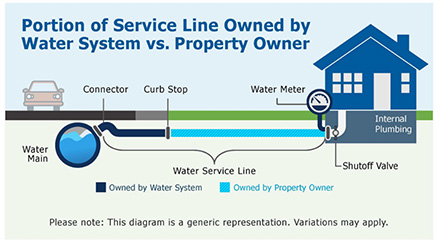
For Residents Receiving Notice of a Lead or Unknown Service Line
In July 2021, the Lead Service Line Replacement Law was enacted, which requires community water systems in New Jersey to identify and replace all lead service lines within 10 years. Under this law, as well as a new regulatory requirement from the U.S. Environmental Protection Agency, water systems must send notices to consumers at a property when they are served by a lead or unknown service line. The information provided below is intended to help ensure that you are informed and prepared in case you receive a notice.
What is a Lead Service Line?
 A service line is the underground pipe that connects the water main to your home or building. Service lines can be made of a variety of materials, such as plastic, copper, galvanized metals, or lead. Ownership of the service line varies by water system but is frequently split between the water system and the property owner.
A service line is the underground pipe that connects the water main to your home or building. Service lines can be made of a variety of materials, such as plastic, copper, galvanized metals, or lead. Ownership of the service line varies by water system but is frequently split between the water system and the property owner.
Lead service lines are a significant source of lead in drinking water in residential homes. A lead service line is a service line made of lead or a service line connected to a lead pigtail, lead gooseneck, or other lead fitting. In New Jersey, galvanized service lines are also considered lead service lines.
How Would I Receive a Notice?
Your water system will send notices via mail or by another state-approved method.
When Would I Receive a Notice?
If you receive a Notice of Lead Service Line Material:
- Your water system has identified the service line that provides water to your residence as a lead or galvanized service line.
- Water systems should send notices of lead service line material by August 10 annually.
If you receive a Notice of Unknown Service Line Material:
- Your water system has not yet identified the material of the service line to your home, and there is a possibility that your home is served by a lead service line. There are many reasons that service lines cannot be identified, including a lack of public records or difficulties in manual verification of service line material.
- Water systems should send notices of unknown service line material no later than November 15, 2024.
What Information Will a Notice Include?
- A statement that your service line material is either lead, galvanized, or unknown.
- An explanation of the health effects of lead.
- Steps you can take to reduce your exposure to lead.
- Information on opportunities to replace your service line if it is confirmed lead or galvanized requiring replacement.
- Information on opportunities to verify the material of the service line if it is unknown.
What Should I Do If I Receive a Notice?
If you were notified that you have a lead service line serving your home, your water system will coordinate its replacement. Property owners may be responsible for covering the replacement cost of their portion of the service line. Reach out to your water system for details about the replacement process, and to learn how costs are being assessed. If you are planning to replace your lead service line on your own, contact your water system prior to replacement so that you can coordinate your efforts.
If you were notified that your service line material is unknown, your water system will continue to investigate its material. Next steps may involve manual verification of the service line material (i.e., taking a photo of the plumbing where your water meter is located). Reach out to your water system for instructions on how to verify your service line material or to schedule an appointment for water system staff to visit your home. You can also refer to the following guidance for how to self-identify your service line material.
What If I Do Not Receive a Notice?
If you do not receive a notice, contact your water system or refer to your water system’s website to ask about your service line material. You can also refer to the following guidance for how to self-identify your service line material.
Questions about your service line or your town’s service lines?
Please reach out to your water supplier.
If you are uncertain who your water supplier is, you can look it up on NJ Drinking Water Watch.
For other questions:
LeadInDW@dep.nj.gov or 609-292-5550